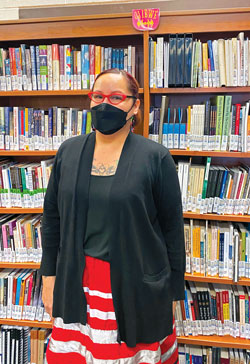Tribal Libraries in Michigan to Create New Classification System with Community Input
Thanks to an IMLS grant, the Saginaw Chippewa Tribal Libraries will say goodbye to the Dewey Decimal and Library of Congress Classification systems.
 |
rudall30/Getty Images |
A small, rural Indigenous community in central Michigan is coming together to take on a big project involving its libraries.
“Many of the Library of Congress subject headings were designed by folks who really did not see the full humanity of Indigenous people, and their worldview is reflected in the systems that they made,” says Anne Heidemann, the librarian who wrote the grant proposal.
The $238,000 grant project, Decolonizing Libraries to Foster Community Well-Being, also seeks to provide a framework that other libraries can follow to overhaul their classification systems. The plan is for the group to select a classification system by the end of the year and start implementing it in 2023.
The tribal libraries consist of three libraries: an elementary school one with a collection of about 16,000 items, a college library with some 2,500 items, and a public library with around 7,000 items. The elementary school library is the only one not open to the general public.
 |
Summer Peters is helping to create a new library classification system.Photo courtesy of Summer Peters |
Both systems currently used by the libraries come with inherent, structural issues. The Dewey Decimal System is nearly 150 years old, and critics contend it’s built on racism and sexism. For example, Heidemann points out, books dealing with the creation story found in the Bible are listed in the 200s under religion, but creation stories from Indigenous communities are listed in the 300s under folklore.
The Library of Congress (LOC) system, which is used at the tribe’s college library, is equally problematic where Native people are concerned, she says.
“Everything Indigenous goes in the history section, and that is a huge issue, because Indigenous people do exist and are historicized widely,” says Heidemann, who is not Indigenous. “People always are saying, ‘Oh, this did happen, these people were there or whatever,’ but no—they are there now.”
Problems such as these are well documented, and librarians such as Heidemann have tried to tweak the systems to bring them into the 21st century.
But Heidemann says she soon realized that was inadequate.
“It was very clear to me early on that I am not the person who can say what is good or not good in this situation,” says Heidemann. “I serve the community, but I am not a member of the community.”
Heidemann is working on the project alongside Summer Peters, a member of the Saginaw Chippewa tribe who serves as the project’s grant facilitator.
“What this work means to me is, we’re finding our voice, and we’re learning to exist and excel in spaces that weren’t meant for us originally,” says Peters.
She’s been talking to Indigenous library experts about classification systems and has brought together a group of community members who began meeting in February. She hopes to have a decision about a new system by the end of the year.
Many people were unaware of the racist nature of the old classification systems before agreeing to serve on the committee, according to Peters.
“They’re shocked, and they’re ready to start putting in that work to make our libraries work for us the way that we want it,” she says.
The group of 10 to 15 people meet virtually once a month for three hours. The members belong to either the Saginaw Chippewa tribe or other local tribes, and the group includes a mix of young and old, those with traditional Western education and those with extensive tribal knowledge. But they will all function as equals.
The grant calls for the group to “create a system of organization for cataloging and classifying library materials according to Anishinaabe ways of knowing and being.” The Saginaw Chippewa Tribe is part of the Anishinaabe, a broader group of Indigenous people who have lived on this land since long before colonists arrived.
There’s been some preliminary discussions about using the Brian Deer Classification System, which has an Indigenous origin, or using a system that incorporates the Saginaw Chippewa tribe’s clan system, which dictates a person’s role in life. For example, Peters is part of the Bear clan, a group associated with law enforcement and regulations. There are particular characteristics associated with each clan, and those traits could be used to group materials.
As of now, no one knows what the new system will look like. The only certainty is that it will be community-driven.
“I had to write the grant proposal not knowing what the process would look like because again, the point is that it’s not me figuring it out,” says Heidemann. “Systems will always reflect their makers, and it seems only right that an Indigenous-serving library would use an Indigenous-created system—and even better, a system created locally by the same people who use the library.” n
Education journalist Marva Hinton hosts the ReadMore podcast.
RELATED
The job outlook in 2030: Librarians will be in demand
The job outlook in 2030: Librarians will be in demand
ALREADY A SUBSCRIBER? LOG IN
We are currently offering this content for free. Sign up now to activate your personal profile, where you can save articles for future viewing





Add Comment :-
Be the first reader to comment.
Comment Policy:
Comment should not be empty !!!